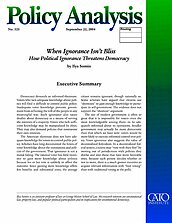Democracy demands an informed electorate. Voters who lack adequate knowledge about politics will find it difficult to control public policy. Inadequate voter knowledge prevents government from reflecting the will of the people in any meaningful way. Such ignorance also raises doubts about democracy as a means of serving the interests of a majority. Voters who lack sufficient knowledge may be manipulated by elites. They may also demand policies that contravene their own interests.
The American electorate does not have adequate knowledge for voters to control public policy. Scholars have long documented the limits of voter knowledge about the institutions and policies of the government. That ignorance is not a moral failing. The rational voter has little incentive to gain more knowledge about politics because his or her vote is unlikely to affect the outcome. Since gaining more knowledge offers few benefits and substantial costs, the average citizen remains ignorant, though rationally so. Some scholars have argued that citizens use “shortcuts” to gain enough knowledge to participate in self-government. The evidence does not support the “shortcut” argument.
The size of modern government is often so great that it is impossible for voters–even the most knowledgeable among them–to be adequately informed about its operations. Smaller government may actually be more democratic than that which we have now: voters would be more likely to exercise informed control over policy. Voter ignorance also suggests the value of decentralized federalism. In a decentralized federal system, citizens may “vote with their feet” by moving out of jurisdictions with policies they dislike and into those that have more favorable ones. Because each person decides whether or not to move, there is a much greater incentive to acquire relevant information with “foot voting” than with traditional voting at the polls.

This work is licensed under a Creative Commons Attribution-NonCommercial-ShareAlike 4.0 International License.

